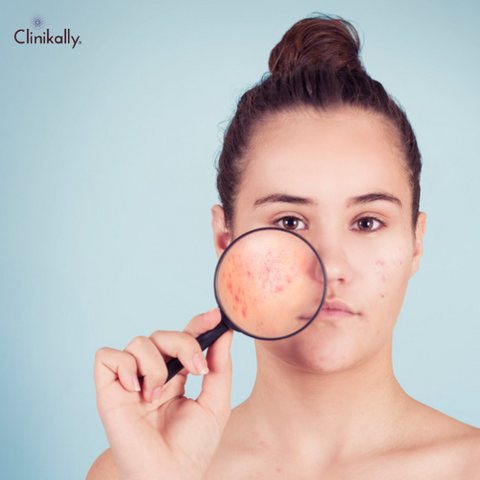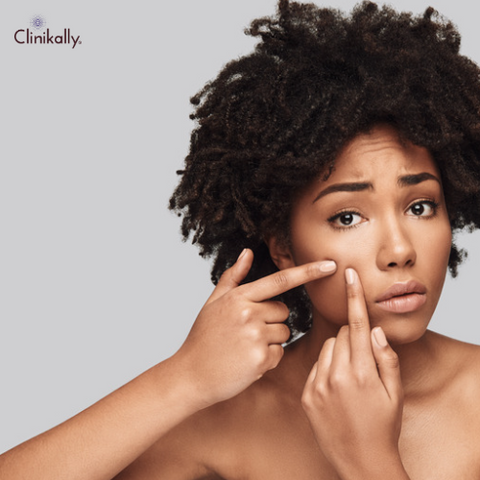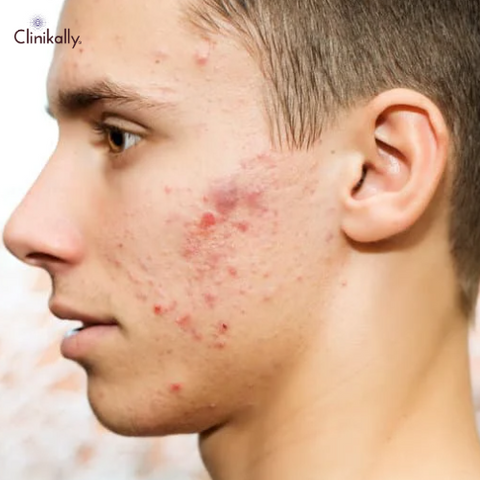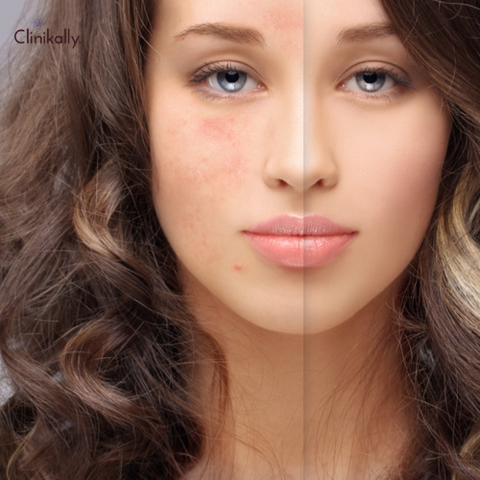The link between junk food and acne is a contentious and hotly debated topic. Although some studies have suggested a connection between the two, the evidence is conflicting, and a variety of factors can cause acne to develop.
The following are some truths and myths regarding junk food and acne:
Myth: Consuming greasy foods and chocolate will result in acne.
Truth: While some studies have suggested a connection between eating foods with a high glycaemic index (GI) and acne, there isn't solid proof that eating greasy foods or chocolate makes acne worse. The high sugar content in these foods, which can cause elevated insulin levels and inflammation in the body, is most likely to blame.
Myth: Giving up junk food will help you get rid of acne.
Truth: While altering your diet and reducing your intake of junk food can improve your general health, acne is not likely to go away on its own. Acne is a complicated condition that can be brought on by a number of things, such as hormones, genetics, and way of life.
Myth: Eating a healthy diet will help you avoid acne.
Truth: Although maintaining a healthy diet can prevent acne by lowering body inflammation, it cannot always do so. Due to their hormonal composition, many seemingly healthy foods, such as dairy products, can actually worsen acne.
Myth: Acne can be treated with a lot of water.
Truth: While maintaining hydration is beneficial to overall health and can aid in the removal of toxins from the body, it is unlikely to effectively treat acne on its own. Drinking water is not a substitute for expert skincare or medical care, even though keeping the skin hydrated and supple can help with appearance.
While junk food may not be the direct cause of acne, it can contribute to bodily inflammation, which can make the condition worse. A healthy diet and a decrease in junk food consumption can undoubtedly help with acne prevention, but they cannot treat acne on their own. Acne management may require proper skin care, lifestyle changes, and medical attention.
What Causes Acne?

The skin condition known as acne can be caused by a number of things, such as:
-
Sebum production that is excessive: The skin's sebaceous glands produce sebum, an oily substance. Acne can develop as a result of clogged pores caused by excessive sebum production.
-
Bacteria: The bacteria Propionibacterium acnes (P. acnes) is commonly found on the skin, and when it mixes with excess sebum, it can cause inflammation and lead to the formation of acne.
-
Skin inflammation: Skin inflammation can make acne worse and also make scarring more likely.
-
Hormonal changes: Hormonal changes, especially those that occur during puberty, can raise sebum production and cause acne to develop. Acne may also result from hormonal changes during pregnancy or menstruation.
-
Genetics: Acne can be inherited, so if your parents had it, you are more likely to as well.
-
Certain medications: As a side effect, corticosteroids, among other medications, can cause acne.
-
Diet: Although the relationship between diet and acne is not completely understood, some studies indicate that a diet high in sugar and refined carbohydrates may help acne develop.
The Science of Acne: From Sebum Production to Inflammation
Acne is a common skin condition brought on by oil and dead skin cell clogs in the hair follicles. A number of things, including sebum production, bacterial development, inflammation, and hormonal changes, contribute to acne. The sebaceous glands in the skin produce sebum, an oily substance. Sebum typically keeps the skin moisturised and stops it from drying out, which is essential for maintaining healthy skin. On the other hand, excessive sebum production can cause acne to appear in people with acne-prone skin. Whiteheads or blackheads can develop when too much sebum combines with dead skin cells and bacteria in the hair follicles to form a plug.
Propionibacterium acnes (P. acnes) is a bacterium that is frequently found on the skin and causes acne. P. acnes bacteria can cause inflammation and infection when they become trapped in hair follicles with too much sebum and dead skin cells. In response to a bacterial infection, the immune system of the body produces redness, swelling, pimples, pustules, and nodules on the skin. The development and severity of acne are both significantly influenced by inflammation. Scarring and hyperpigmentation may result from the immune system's reaction to the inflammation brought on by the P. acnes bacteria. In some cases, the swelling can become so severe that it leads to cystic acne, a more severe form of acne characterised by large, uncomfortable cysts that can leave permanent scars. Hormonal changes can also influence acne development. The increase in hormone levels that occurs during puberty is what causes acne to develop. In some women, the hormonal changes brought on by menstruation or pregnancy can result in acne.
The Role of Hormones, Genetics, and Environment in Acne Formation
Acne is a multifactorial condition that is influenced by a number of variables, including hormones, genetics, and the environment. Acne development is significantly influenced by hormones. During puberty, both sexes experience an increase in androgens, male hormones that encourage the sebaceous glands to produce more oil. The increased production of oil can cause acne to develop. In some women, hormonal changes related to menstruation or pregnancy can also result in acne.
Acne development may also be influenced by genetics. According to studies, if one or both parents have acne, there is a higher chance that their kids will also have acne. Sebum production, inflammation, and the body's reaction to hormonal changes can all be impacted by specific genetic variations, which can all result in acne. Acne development may also be influenced by environmental factors. Acne can develop as a result of exposure to pollutants, high humidity, wearing constricting clothing, or using helmets.
Does Junk Food Really Cause Acne?

The connection between diet and acne is still being studied, and there is no clear consensus on the role of junk food in acne formation. Acne and foods with a high glycemic index, such as sugary or starchy foods, have been linked in some studies, but the evidence is far from conclusive.
According to one theory, eating foods with a high glycaemic index can result in a sharp increase in blood sugar levels, which can then lead to hormonal changes that cause an increase in sebum production and inflammation, both of which can help acne develop. However, there is conflicting evidence supporting this theory, and more study is needed to fully understand how diet and acne are related. Although a diet high in processed foods and low in nutrient-dense foods (such as fruits, vegetables, and lean protein) may not directly cause acne, it can contribute to general inflammation and poor skin health.
The Link between Diet and Skin Health: Separating Fact from Fiction
There are some links between diet and skin health, but not all of the claims are backed by substantial evidence. This field of research is still ongoing. Here are some crucial details regarding the connection between diet and skin health:
-
An antioxidant, vitamin, and mineral-rich diet can help shield the skin from oxidative stress, a significant factor in skin ageing. On the other hand, a diet rich in sugar and bad fats may hasten the ageing process of the skin.
-
While the evidence is mixed, some studies have suggested that a diet high in refined carbohydrates (such as sugary drinks and white bread) may increase the risk of developing acne. However, more research is needed to fully understand the link between diet and acne.
-
Keeping the skin hydrated and looking healthy can be achieved by drinking enough water and eating foods high in water content, such as fruits and vegetables.
-
Vitamin E is a powerful antioxidant that can aid in protecting the skin from sun damage, while vitamin C is essential for collagen synthesis, which is essential for skin elasticity.
-
For instance, there is no evidence to support the theory that foods like chocolate or greasy food contribute to acne.
The Impact of Sugar, Processed Foods, and Dairy on Acne Formation
There is some evidence that certain foods may contribute to the development of acne in some people, but the connection between diet and acne is complex and poorly understood. Following is what we know about how dairy, processed foods, and sugar affect acne:
-
Sugar: Consuming a lot of sugar can quickly raise blood sugar levels, which can then set off hormonal changes that increase inflammation and sebum production, both of which can help acne develop. Acne may be more likely to develop in people who consume a diet rich in sugar and foods with a high glycemic index, such as white bread and pasta.
-
Processed foods: Eating a lot of processed food can cause the body to become inflamed, which can then have an impact on the skin. According to some studies, eating a diet rich in processed foods and lacking in whole foods that are nutrient-dense (like fruits, vegetables, and lean protein) may increase your risk of getting acne.
-
Dairy: Some studies have suggested that consuming dairy products (such as milk, cheese, and yogurt) may increase the risk of acne development. This may be because dairy products contain hormones and growth factors. However, more research is required to fully understand the connection between dairy and acne as the evidence is not yet conclusive.
The Role of Glycaemic Index, Omega-3 Fatty Acids, and Antioxidants in Skin Health
The glycaemic index, omega-3 fatty acids, and antioxidants are all significant elements that can influence the health of the skin. What you need to know is as follows:
-
Glycaemic index: The glycaemic index measures the rate at which carbohydrates are broken down and converted into glucose in the bloodstream. High glycaemic index foods (such as white bread and sugary drinks) can cause a rapid spike in blood sugar levels, triggering hormonal changes that contribute to inflammation and acne development. Foods with a low glycaemic index, on the other hand, are broken down more slowly, resulting in a more gradual release of glucose and a lower risk of inflammation.
-
Omega-3 fatty acids: Omega-3 fatty acids are essential fats that play a critical role in skin health. They aid in the reduction of inflammation, the promotion of skin hydration, and the prevention of sun damage. Fatty fish (such as salmon and sardines), nuts and seeds (such as flaxseed and chia seeds), and leafy greens are all high in omega-3s (such as spinach and kale).
-
Antioxidants: Antioxidants are compounds that protect the skin from oxidative stress, which can cause ageing and damage to the skin. They aid in the neutralisation of free radicals (unstable molecules that can cause cell damage) and promote healthy collagen production. Colourful fruits and vegetables (such as berries, citrus fruits, and leafy greens), nuts and seeds (such as almonds and sunflower seeds), and spices are high in antioxidants (such as turmeric and ginger).
Other Factors that Affect Acne Formation and Prevention

There are additional factors that can impact acne development and prevention in addition to diet and nutrition. Some of them are as follows:
-
Hormonal fluctuations: Acne can develop as a result of hormonal fluctuations, particularly those that occur during puberty, menstruation, pregnancy, and menopause. Androgens, a type of male hormone that exists in both men and women, can increase the growth of bacteria on the skin and stimulate oil production, which can result in acne.
-
Genetics: People who have a history of acne in their families are more likely to experience it themselves. The way the skin reacts to hormonal changes, inflammation, and other acne triggers can be influenced by specific genetic factors.
-
Skincare items: Using certain skincare items, particularly those that contain comedogenic ingredients (like mineral oil and lanolin), can clog pores and cause acne to develop. It is important to choose non-comedogenic products that are suitable for your skin type.
-
Environmental factors: Environmental factors like heat, humidity, and pollution can make acne worse. The buildup of bacteria, oil, and dirt on the skin as a result of sweating can result in acne.
-
Stress: Stress has the potential to disrupt the body's hormonal balance and fuel inflammation, both of which can lead to the development of acne. Stress management techniques, exercise, and other stress-relieving activities are crucial.
As a result, it is crucial to take into account all the variables that may affect the development and treatment of acne because it is a multifactorial condition. Acne can be prevented and controlled by using a holistic approach that incorporates a healthy diet, good skin care habits, and stress reduction techniques.
The Impact of Vitamins, Hydration, and Stress on Skin Health
There are additional factors that can have an impact on overall skin health in addition to those that affect the development and prevention of acne. Here are a few instances:
-
Vitamins: Several vitamins are necessary to maintain healthy skin. Vitamin C, for example, acts as an antioxidant to shield the skin from oxidative damage and promote the synthesis of collagen, which keeps the skin smooth and firm. Vitamin A, also known as retinol, is a compound that can be used to treat acne and help regulate the growth of skin cells. Vitamin E is another antioxidant that helps protect the skin from UV deterioration and environmental stressors.
-
Hydration: Proper hydration is important for overall skin health. Dehydrated skin can become dry and lifeless, and fine lines and wrinkles can look more pronounced. The use of moisturisers and adequate hydration can help to maintain healthy, hydrated skin.
-
Stress: Stress can have a detrimental effect on the health of the skin. Stress causes the body to release hormones like cortisol, which can cause breakouts and inflammation. Poor sleep can be a result of stress and have an adverse effect on skin health. Skin health can be enhanced by reducing stress through relaxation methods, exercise, and other stress-relieving activities.
-
Sun exposure: Excessive exposure to the sun's UV rays can harm the skin and increase the risk of skin cancer as well as sunburn and premature ageing. When spending time in the sun, it's crucial to wear sunscreen and protective clothing to protect your skin.
-
Drinking excessively and smoking: Both of these behaviours can harm the health of your skin. Smoking can hasten ageing, wrinkles, and a dull complexion while drinking too much alcohol can cause dehydration and inflammation, both of which can hasten skin issues.
Developing a Skin Care Routine for Acne-Prone Skin
It's critical to create a skincare routine that caters to your unique needs if you have acne-prone skin. Here are some guidelines for creating a skincare routine for skin that is prone to acne:
-
Cleanse: To begin, cleanse your skin using a mild cleanser designed for skin that is prone to acne. Salicylic acid and benzoyl peroxide are two ingredients to look for in products because they can help to clear clogged pores and lessen inflammation.
-
Tone: After cleansing, use a toner to help restore the pH balance of your skin and get rid of any leftover oil or dirt. In order to soothe and purify the skin, look for toners that contain witch hazel, tea tree oil, or other all-natural ingredients.
-
Treat: If you have active breakouts, use a spot treatment to help reduce inflammation and promote healing. Look for products that contain salicylic acid, benzoyl peroxide, or tea tree oil, as these ingredients can be effective in treating acne.
-
Moisturise: Even if you have oily skin, it is important to use a moisturiser to help keep your skin hydrated and healthy. Look for moisturisers that won't clog your pores or result in breakouts that are oil-free or non-comedogenic.
-
Protect: Finally, protect your skin from the sun by using broad-spectrum sunscreen with an SPF of 30 or higher. To make sure that a product won't clog your pores, look for the words "oil-free" or "non-comedogenic" on the packaging.
There are several additional things you can do to aid in the prevention of acne and to promote healthy skin in addition to these fundamental actions. These consist of:
-
Exfoliating once or twice a week can help remove dead skin cells and unclog pores.
-
preventing the use of abrasive cleansers and abrasive scrubs that can irritate your skin and cause breakouts
-
Eating a nutritious, well-balanced diet full of vitamins and antioxidants
-
keeping your skin hydrated by consuming lots of water
-
Managing stress through exercise, breathing exercises, and other stress-relieving activities
It might take some trial and error to find the products and routines that are most effective for you because everyone's skin is unique. Be persistent and patient, and don't be afraid to ask a dermatologist for help if you're having trouble with acne or other skin issues.
Recognizing and Treating Different Types of Acne: Blackheads, Whiteheads, Pimples, and Blemishes
Skin conditions like acne can appear in a variety of ways. The most typical forms of acne and how to treat them are listed below:
-
Blackheads: Small, dark spots that develop on the skin's surface are known as blackheads. They originate from blocked pores that have become oxidized from air exposure. Try using a cleanser that has salicylic acid or benzoyl peroxide to help clear clogged pores in order to treat blackheads. For expert extraction, you can also use a pore strip or visit a dermatologist.
-
Whiteheads: Whiteheads resemble blackheads, but they are sealed at the skin's surface and do not darken. They can be treated the same way as blackheads and are brought on by the same things.
-
Pimples: Pimples are inflamed bumps that form on the skin. They are usually bright red and tender to the touch. Clogged pores, bacteria, and inflammation are all factors that contribute to pimples. To treat pimples, apply a spot treatment containing salicylic acid or benzoyl peroxide to reduce inflammation and kill bacteria.
-
Cysts: Cysts are large, painful bumps that form deep beneath the surface of the skin. They are the result of a combination of factors such as clogged pores, bacteria, and inflammation. You may need to see a dermatologist for prescription-strength medication to treat cysts, such as oral antibiotics or isotretinoin.
-
Blemishes: Blemishes are a catch-all term for any type of skin flaw, including acne scarring and discoloration. To treat blemishes, use a product containing retinol or vitamin C to promote cell turnover and reduce discoloration. A dermatologist can also provide professional treatments such as chemical peels or laser therapy.
Remember that when treating acne, you must be patient. The healing process could take weeks or even months, so be diligent about sticking to your treatment schedule and skincare regimen. Do not hesitate to consult a dermatologist for advice if your acne is severe or persistent.
Conclusion

Although dealing with acne can be frustrating, it is a common skin condition that can be effectively managed with the right information and care. In order to develop an effective skincare routine, it is crucial to understand the causes of acne, which include changes in hormones, genetics, and environmental factors. Although there is some evidence that diet may contribute to acne development, it is more important to focus on general healthy eating habits than to avoid any particular foods. Finding the best products and treatments for your skin type may require some trial and error. Treating acne requires patience and consistency. Those with severe or persistent acne may find it helpful to work with a dermatologist. With the proper care, you can have clearer, healthier skin and feel more assured about your appearance.








































